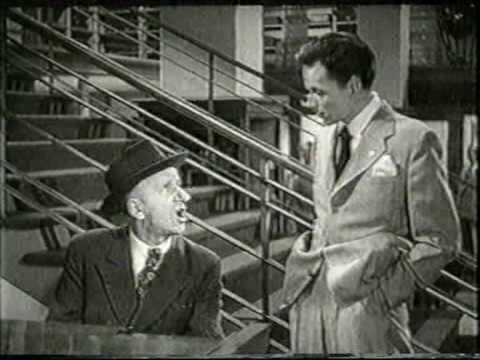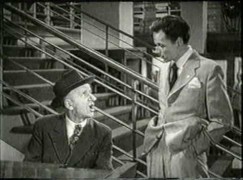Frank Sinatra: I used to visit all the gay places…
mainVariety has been allowed to release a long-suppressed recording.
Listen here.


Variety has been allowed to release a long-suppressed recording.
Listen here.

Bavarian Radio is claiming him as a local…

The orchestra has cancelled concerts until after the…

In a Telegraph interview with Nicholas Kenyon, Dudamel…

The Viennese emporium of Doblinger, where Beethoven bought…

Session expired
Please log in again. The login page will open in a new tab. After logging in you can close it and return to this page.
He keeps messing up, which is not surprising because it’s a hard song, but also surprising because he was a stickler for singing in tune. Sounds like he just hadn’t learned it yet to his own satisfaction. Too bad he never came back to it — this has the makings (but only the makings) of a classic like “One For My Baby (And One More For The Road).”
Of note is that several months after bennett sang his San Francisco song in 1962, Frank did a cover and it bombed. It was pulled in a matter of weeks
From my current book about the songwriters cory and cross.
I’m a HUGE fan of Frank. IMHO Frank and Tony Bennett are the greatest singers of what’s referred to as “The American Songbook”.
But I think in this case, it’s pretty apparent that Frank just didn’t know the song very well. You can hear at the end, just before he bails out, he totally sings off the rails. A shame – that beautiful intro was wasted!
It’s too bad he didn’t return to this beautiful Billy Strayhorn song, “Lush Life”. I think he would have nailed it (had he learned it).
BTW (and you are all probably aware of this already), at the time this song was written by the homosexual composer Strayhorn, the word gay generally meant happy, not homosexual. I personally do not think Strayhorn was sending any kind of “message” here.
And if you ever run a post for underrated or unappreciated composers, Norman, Billy Strayhorn would be an exhibit “A”.
Alan: Thank you for promoting Billy Strayhorn. He composed a fine piece for horn and piano. It was, I believe, the last piece he ever wrote. I have been trying unsuccessfully, to get hold of it in order to have it played by one of the Berlin Philharmonic horn players (it’s not jazz at all). Would you have any idea about its availability? Thank you.
Ruben: Thank you for the thanks.
Strays was a lovely, quiet, peaceful man and a vastly overlooked composer, and as you suggest, not only in the field of jazz.
But I’m afraid I am unable to help you in your quest. So sorry…. and good luck!
Ruben, perhaps these links might help you find the piece that you are looking for:
http://www.courant.com/news/connecticut/hc-xpm-2005-09-17-0509170247-story.html
http://www.willieruff.com/index.html
Phillip: many thanks for the Willie Ruff clue. Mr. Ruff premiered the work. Unfortunately, I’ve already tried him, but never received an answer. I try to promote “Classical” pieces composed by jazz musicians.
I agree with you completely that Billy Strayhorn was not sending any kind of ‘message’, He was truly as gifted as he was modest. As a black man in America in the early part of the 20th Century he became painfully aware that concert opportunities for his desired creation of concert works would be limited.
Duke Ellington gave him the opportunity to meet an audience for his artistic compositions which were truly jazz impressionism. By the way. he started on ‘Lush Life’ as a teenager, before ever meeting Ellington; finishing most of it by the time he was 20. The song wouldn’t be recorded until more than a dozen years later.
Thank you, Phillip, for your reply, which is right on the money.
I met Duke after Strays had died, and although we didn’t have the chance to talk about Strays, The Duke Ellington Orchestra played his compositions ’till the day Duke himself died, and the inevitable “ghost band” is probably still playing them.
All the reasons why we just LOVED Frank Sinatra are there in that song; able to follow any melody line, no matter how unpredictable, phrasing to-die-for and an ability to shape the song no other popular musician had. And what an excellent song this one is!!
The problem was that Sinatra was trying to sing the song as a ballad with a pure legato chromatic tune, with the melodic line driving the lyrics rather than the other way around, but that is not the right style, and even if it were, he didn’t have the technique to pull it.
So, at his tempo and melodic approach
– Lady Gaga does have the technique to pull it off, aria like, but it’s stylistically all wrong, Lush life is not operatic.
– Sarah Vaughn has the range, and technique to burn, in pulling it off, but she keeps it in check and always lets the lyrics drive the melody, and it works beautifully
Strayhorn’s and Cole’s tempi are faster, but more importantly, the lyrics completely determine how they break up and phrase the melodic line and hit the notes, and that, I think, is the right style.
I like this version, with Joe Williams: https://www.youtube.com/watch?v=y7Ng-c9ZS3k
(I got to know the song from Ella’s “Duke Ellington Songbook” album, with Ellington at the piano, but she didn’t really have the emotional range for a song like this.)
Lush Life is a bad song with a lousy, weak melody.
No wonder Sinatra sounds uninspired here because Nelson’s arrangement is all over the place, far too ambitious. No wonder it was dumped.
LOL
Thanks Rob. Oh, you forgot to say that Duke had no inspiration and Basie couldn’t swing. But we’re so glad you contributed…
I thought it was a wonderful song with an unpredictable melody line and interesting lyrics to music interaction.
Of course it is. Charlie Mingus knew it, who wrote his own “Duke Ellington’s Sound of Love” as a musical tribute to “Lush Life” (same key, quote of the ending). Be sure to check out this one if you don’t know it…
Link does not seem to work, but it’s already on YouTube.
https://www.youtube.com/watch?v=O2-MalOvxD4
The Coltrane/Johnny Hartman version covers most of the bases. The first version of Tchaikovsky’s Nutcracker I heard was the Strayhorn arrangement for the Ellington band. And while Strayhorn might not have intended “Lush Life” to be about the gay experience, it doesn’t take much effort to interpret the song that way. Perhaps it’s about cruising in bars in a more universal fashion but that doesn’t mean it has to be.
I absolutely love that Tchaikovsky/Strayhorn/Ellington Nutcracker!
A friend of mine, ages ago, bought the LP for me as a joke. He was a total classical head, and disdained jazz. What a square!
I still have that LP somewhere in the archives….
It is wonderful! It was mostly written by Strays. As was the Pier Gynt Suite.
As suggested in the article, not having Nelson Riddle around at the recording session surely didn’t help. What an intriguing arrangement, especially the very strange piano intro. At first Frankie doesn’t sound so uncomfortable with the melodic line, yet there’s a little uncertainty about this ascending phrase “…relaxes on the axis OF THE wheel of life…”. But what really makes this already difficult song more tricky, is modulating up a half-step at the end of the verse, to start the main theme in D instead of D Flat. Had Riddle stayed in the usual key, maybe Frankie could have gone on. Anyway makes you feel like hearing the rest of the arrangement, can score and parts by chance be traced somewhere? And get recorded, with Kurt Elling or someone…
I wonder how much would Sinatra have rehearsed this with just a pianist before this session.
The Sinatra spokesman give a bit of a mixed message while explaining what we have here..
After insisting that Sinatra did not abandon this song because it was difficult, he tries to support that by citing another example of a song that Sinatra put aside for a while because… the arrangement was “difficult”.
I don’t think Sinatra was comfortable with the sing and with Felix Slatkin conducting the Riddle chart with little understanding of both the chart and song, this was doomed. Listen to Linda Ronstadt sing basically the exact same Riddle chart years later. And Nelson won a Grammy for Linda’s version.
Thank you for pointing to the Ronstadt-Riddle effort (they did three albums together). But no, if you’re referring to this:
https://www.youtube.com/watch?v=FcIfGkRZn2I
it’s not the exact same arrangement, it’s a new one, almost everything is different, to start with the key. Which makes me curious, as I said above, to hear the entire original chart…
Wow, this had the potential to become something quite special. The verse is actually not too bad – still a few minor pitch problems and a tangle with the lyric occasionally, but it’s almost there. The jazz waltz feel from “Then you came along with your siren song…” is a nice arrangement touch – sets it apart from other versions. Alas, from the beginning of the chorus, (“Life is lonely again…”), his singing falls apart – just not secure enough with the melody – yet! Yes, it’s a difficult song, but others have nailed it, Frank could have and should have! What a shame – one of the great “if onlys” of all time. BTW, one of my favourite versions is by Jack Jones, early 1960s. https://www.youtube.com/watch?v=TkATu6Gr4qM
Sammy Cahn and Quincy Jones have both stated that LUSH LIFE written by Billy Strayhorn when he was a teenager, completes his admission to the canon of great American composers.
Frank Sinatra tried to hire Strayhorn as his arranger but was unable to do so. Duke Ellington was able to prevent that from happening. An interesting factoid: Duke Ellington never performed or recorded LUSH LIFE. This song has become the epitome of great songwriting without the influence of the Ellington band. It stood on its own two feet.
Wonderful to see a new generation learning about this piece. There are other great compositions of Billy Strayhorn that were not associated with Ellington. Learn more about this great composer by visiting http://www.billystrayhorn.com
A. Alyce Claerbaut, President
Billy Strayhorn Songs, Inc.
Many thanks for the link! I was not aware of Billy Strayhorn songs, Inc. I worked as a bandboy for the Ellington band around the time Mr. Strayhorn fell ill and died. I, unfortunately, never met him.
Didn’t Ellington play for the Ella Fitzgerald recording of it on the “Duke Ellington Songbook” (small group sessions) album that includes “Lush Life?”
I feel Sinatra’s frustration. It’s just not an arrangement worthy of the song or of him; compare Sarah Vaughn’s Mercury recording.
Well, as Jimmy is musically pointing out to Frank in the still photo above, “It’s gotta come from the heart”! … Frank seems to have well learned the lesson from the great Durante.